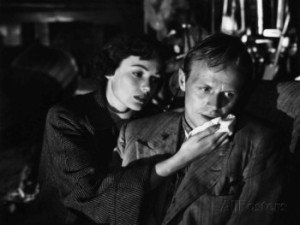 Night and the City, a 1950 crime drama directed by Jules Dassin, tells the story of petty gambler and hustler Harry Fabian (played by Richard Widmark) who finds what he thinks is a perfect stroke of luck: a chance encounter that puts him in a position to be a big player in the London pro wrestling racket. But the mob has a different idea.
Night and the City, a 1950 crime drama directed by Jules Dassin, tells the story of petty gambler and hustler Harry Fabian (played by Richard Widmark) who finds what he thinks is a perfect stroke of luck: a chance encounter that puts him in a position to be a big player in the London pro wrestling racket. But the mob has a different idea.
Made for Fox while Dassin was under stress from the impending threat of the blacklist (the ax finally fell two years later), the picture failed at the box office. It’s difficult for me to understand why—maybe the London location was a turn-off for American audiences. (Why is the story set in London? you may ask. Apparently because it was cheaper to shoot there.)
In any case, Dassin turned in one of the best examples of late “film noir” style. Night and the City makes abundant use of shadow, menacing angles, restless camera movement—and the pace couldn’t be better. This is an exciting film. It captures the fatalistic mood and the sense of evil that are signature noir elements. But the most important ingredient is Richard Widmark, one of the least vain actors to achieve stardom in Hollywood. Here he plays a pathetic lowlife who even steals from his girlfriend (Gene Tierney) to support his gambling habit, yet he seasons his character with enough intelligence, and a sense of constant striving towards a desperate personal dream, to make us care about his fate in spite of everything. It’s his finest performance, holding the viewer’s interest from first frame to last. And I can’t help but think that Harry Fabian sums up, in a way, the postwar letdown symbolized by American film noir. He’s clever and opportunistic; he has good intentions most of the time; he’s always on the lookout for the deal that will strike it rich. But lacking the strength that comes with consistency and perspective, he ultimately sees himself, and is seen by others, as a pitiful loser. The depression and fatalism of these films from the late 40s, surely they reflect a deeper trend in the culture at large.
The beautiful Gene Tierney unfortunately plays a character who is mere window dressing. However, there is fine support from the English actors, especially the massive Francis L. Sullivan as a seedy, malevolent nightclub owner. The photography (Max Greene) and the music (Franz Waxman) are first rate. The climax features a very exciting fight and chase scene, and the whole thing is done in such compelling style that you don’t notice the plot’s improbabilities until you think about it later. It was remade, poorly, in 1992 with Robert DeNiro in the Widmark role. But this original version, with its clear and frightening gaze into the soul of a man without hope, is a true classic.
Night and the City is available on DVD.

